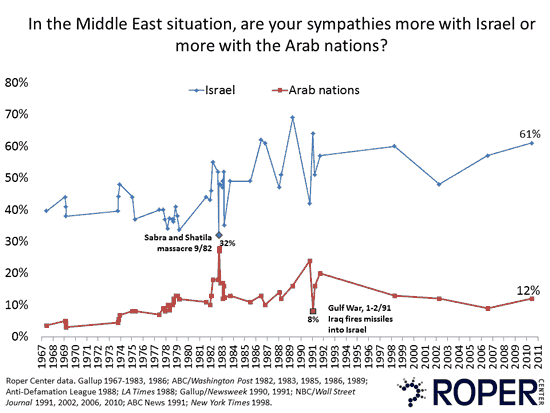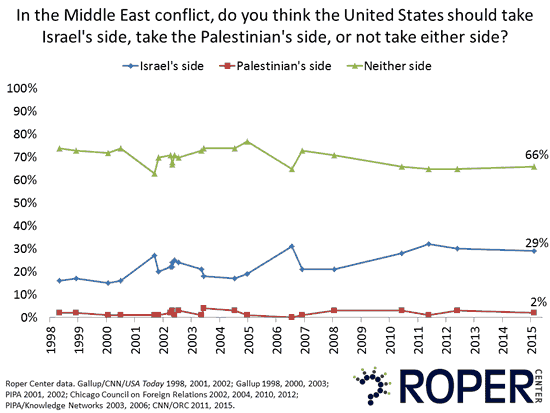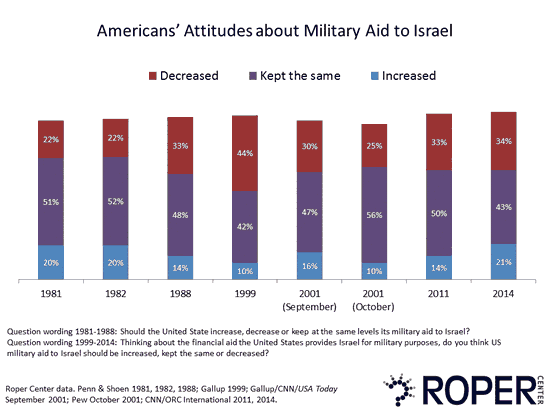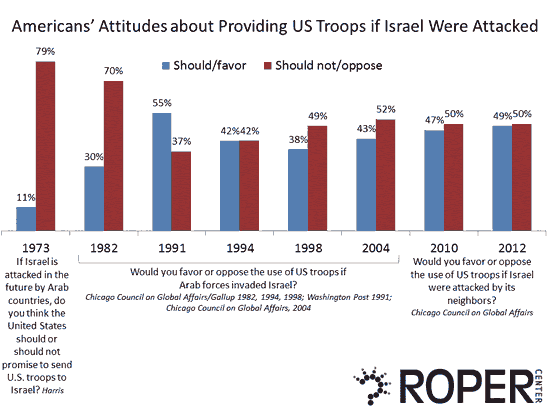When Benjamin Netanyahu spoke to Congress at their invitation, many U.S. leaders marked the occasion by affirming their commitment to the special relationship between the States and Israel. But how do the American people feel? Do Americans support their government's policy toward Israel, and have their feelings changed over the years? From the Roper Center for Public Opinion Research archive:
Personal sympathy and official neutrality
Americans have personally favored the Israelis over the Arab nations from the earliest days of polling. In March 1948, before the state of Israel was officially established, a Gallup poll asked the U.S. public where their sympathies lay in the fighting between the Arabs and Jews in Palestine. Twenty-eight percent said with the Jewish people, 11% the Arabs, and 44% neither. From the late 1960s to today, Americans have consistently sympathized more with Israel. Even at the point when personal favor toward Israel was at its lowest - after the Sabra and Shatila massacre in 1982 - feelings for the Palestinians only barely reached the level of those for Israel. However, a substantial proportion of the public through the years have not expressed partiality to either side, saying instead that they sympathize with neither or both, or that they don't know.
Personal sympathy, however, is not the same as official government policy. When Americans are asked which side the U.S. ought to take in the conflict, with all the potential consequences that implies, a different pattern emerges. While the proportion saying we should take sides with Israel has always been much higher than those siding with the Palestinians, a strong majority since 1998 has said the U.S. ought to take neither side in the hostilities. What the public understands by "taking sides" is, however, unclear, and their disinclination to do so should not be read as a desire to see a major change in current U.S. policy. In a 2015 Pew poll, 48% said that U.S. support of Israel was about right, while another 29% thought it was not supportive enough. Therefore, "taking sides" for many Americans may imply increasing current support, not maintaining it.
Guns and money, yes, but divided on troops
In 1955 Gallup asked Americans for the first time if they favored providing arms to Israel. Half the country said no, 24% yes, and the rest didn't know. At this time, the U.S. was not selling advanced armaments to Israel, instead maintaining a general policy of hands-off neutrality in the region. Military aid to Israel began in a limited way in the sixties, and increased considerably after the Six-Day War in 1967. By 1975, 42% of the country told Time/Yankelovich, Skelly & White that military aid to Israel should be cut back, while 37% thought it should stay the same, and just 8% wanted it increased. By the 1980s, a plurality supported maintenance of current aid levels. Since then support for aid has continued at roughly similar levels, with the exception of a dip in 1999.
While there has been little change over more than thirty years in attitudes about financial aid to Israel for military purposes, willingness to send troops in the case of an attack on the country has increased. The country currently stands nearly evenly split on the question. Questions about whether the U.S. ought to send troops as part of an international peacekeeping mission have also found the country fairly evenly divided over the last decade. The most recent such question, from a 2012 Chicago Council on Foreign Relations poll, found 50% approving the use of U.S. forces in those circumstances, with 48% opposed.
Why Americans believe Israel is important
Even in 1955, most of the country in a Gallup poll thought it was very (34%) or fairly (30%) important for the U.S. to cooperate closely with Israel. Those who said it was very important were then asked to say why in their own words. The most commonly given answers were to keep them from siding with the Russians (19%), to keep the peace in that part of the world (12%) and that it's important to work closely with all countries (12%). Concerns about communism also topped a ranking of most important reasons for U.S. support of Israel in 1988. When this question was asked again a decade later after the break-up of the Soviet Union, the question about communism was not included. Fifty-nine percent of the public in 1998 considered supporting U.S. vital interests in the Middle East a major reason for support, while just over half said Israel's position as democracy in the Middle East or as a secure homeland for the Jewish people were major reasons. Although questions about particular factors in support have not been updated in recent years, polling does show that Americans continue to see the U.S. relationship with Israel as having major significance to U.S. interests. In a 2010 NBC/Wall Street Journal poll, a majority of Americans saw relations with Israel as extremely (39%) or fairly (26%) important to U.S. interests. But while the public sees U.S. interest, most draw the line at U.S. responsibility. Only 35% of the public in a 2014 CBS News poll said the U.S. had a responsibility to try to resolve the conflict between Israel and the Palestinians, while 59% said it did not.




